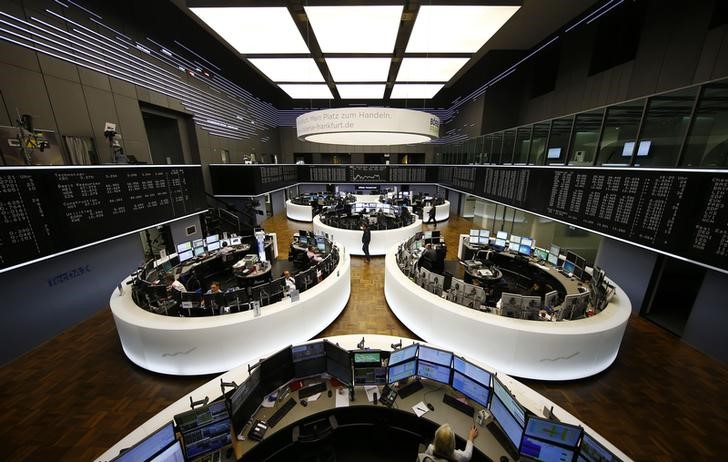By Claire Milhench
LONDON (Reuters) - Investors dumped equities in February as allocations hit the lowest level in at least five years and world stocks fell for the fourth month in a row, with fears of a global recession keeping risk appetite subdued.
Equity allocations shrank by 1.6 percentage points to 46 percent of global balanced portfolios, according to a Reuters poll of 44 asset managers in Europe, Britain, the United States and Japan. Exposure to bonds worldwide rose by 2.4 percentage points to 39.2 percent, the highest in at least five years.
The move reflects a major sell-off in global stock markets since the start of the year (MIWD00000PUS), with $55.7 billion pulled from global equity funds, according to data from Bank of America Merrill Lynch (N:BAC). This represents the longest outflow streak since 2008.
"Investors have been under a cloud of ...risk generated by the unusual amount of noise surrounding issues such as the Chinese economic slowdown, the collapse in the crude oil price and uncertainties surrounding the next move by the Federal Reserve," said Peter Lowman, chief investment officer at Investment Quorum, a UK-based wealth management firm.
The survey was conducted between Feb. 15-24.
During that period heavyweight bank stocks including Deutsche Bank (DE:DBKGn) and Credit Suisse (VX:CSGN) came under huge pressure, as worries grew about how the financial sector would cope with the negative interest rate policies adopted by central banks in Europe and Japan.
Several investors argued that the impact of such central bank moves was weakening, tending to evaporate within days or weeks and now compounding rather than easing banks' and insurers' problems.
"Low or negative interest rates and further loosening of monetary policy cannot create growth or inflation on its own," said Jan Bopp, asset allocation strategist at Bank J. Safra Sarasin.
Citing a number of global economic risks, attendees at a meeting of G20 policymakers in China last weekend reiterated the need to use "all policy tools", but they agreed no new coordinated action to spur growth.
European stocks (FTEU3) are down around 4 percent in February and the Nikkei (N225) has lost over 10 percent, despite the Bank of Japan's (BOJ) surprise adoption of negative interest rates at the end of January.
MONEY AND POLITICS
Some investors, including Giordano Lombardo, chief investment officer at Pioneer Investments Group, said he preferred European and Japanese equities to U.S. ones, saying U.S. earnings growth was most likely late in the economic cycle.
Boris Willems, a strategist at UBS Asset Management, took the same position, citing the accommodative monetary policies still offered by the European Central Bank and BOJ.
Within global equity portfolios, asset managers raised their exposure to euro zone stocks to 19.2 percent, the highest level since September 2015, whilst Japanese equity holdings remained high at 20.2 percent.
Politics also played a growing role.
Exposure to UK stocks fell to 10.9 percent from January's 12.1 percent, suggesting heightened fears that Britain may vote to leave the European Union (EU) in a summer referendum.
An online poll on Friday gave the campaign to take Britain out of the EU a 4 percentage-point lead, pushing sterling near a seven-year low against the dollar
"Sterling has taken the full force of the recent uncertainty ... in allocation the currency has become a big headache," Investment Quorum's Lowman said.
Within fixed income portfolios, asset managers cut their exposure to UK bonds to 10.1 percent, and raised U.S. bonds by about 2 percentage points to 37.7 percent. Euro zone bond holdings were trimmed to 28.4 percent.
Willems said monetary policy divergence would remain a dominant factor in driving asset prices in 2016.
"The U.S. Federal Reserve is unlikely to raise rates in March unless financial market conditions further stabilize and economic data shows marked improvement," he said.
The Fed has kept rates unchanged since a rise in December, and economic concerns have driven the market to scale back expectations of further tightening to just one hike this year.
Both the ECB and BOJ, meanwhile, have stated they will do whatever it takes to stimulate their economies and stave off deflation - though belief in their ability to make a difference is flagging.

"They are not out of weapons, especially in the euro zone where quantitative easing has only started a year ago," said Nadege Dufosse, head of asset allocation at Candriam. "But the mistrust is now growing."